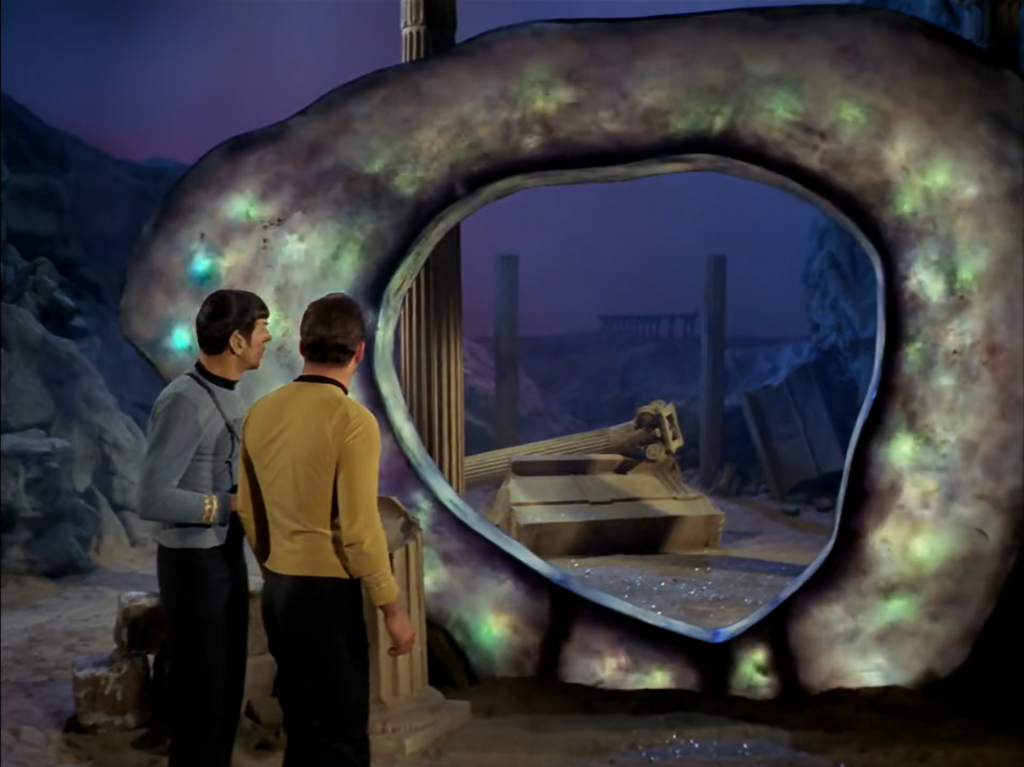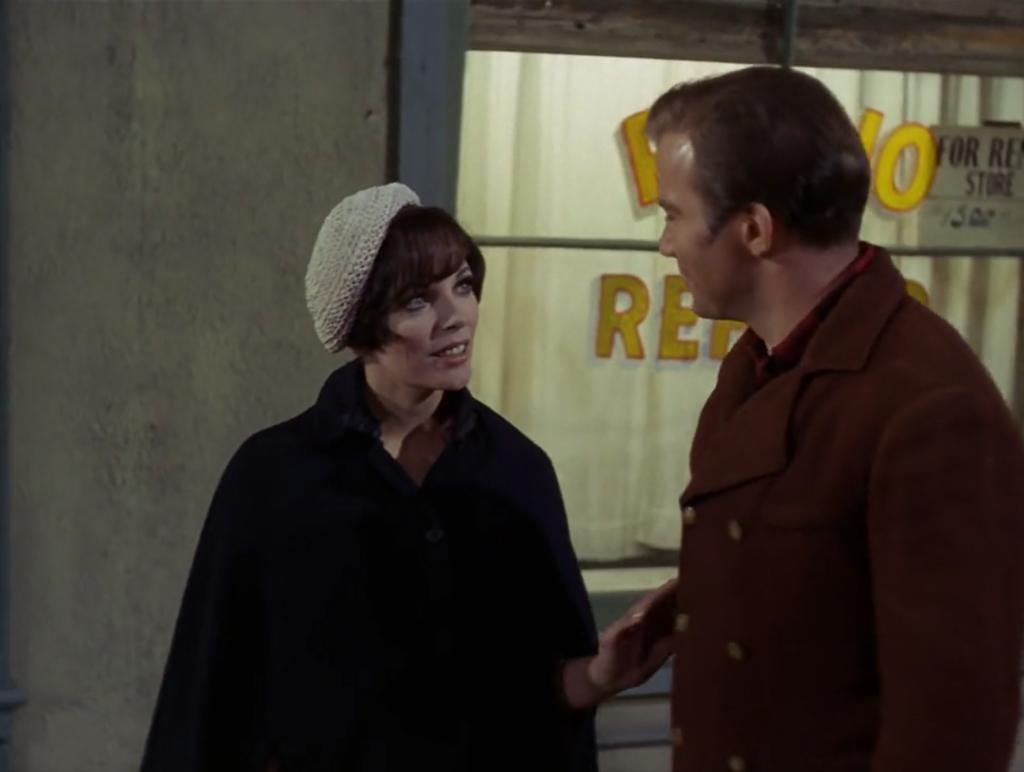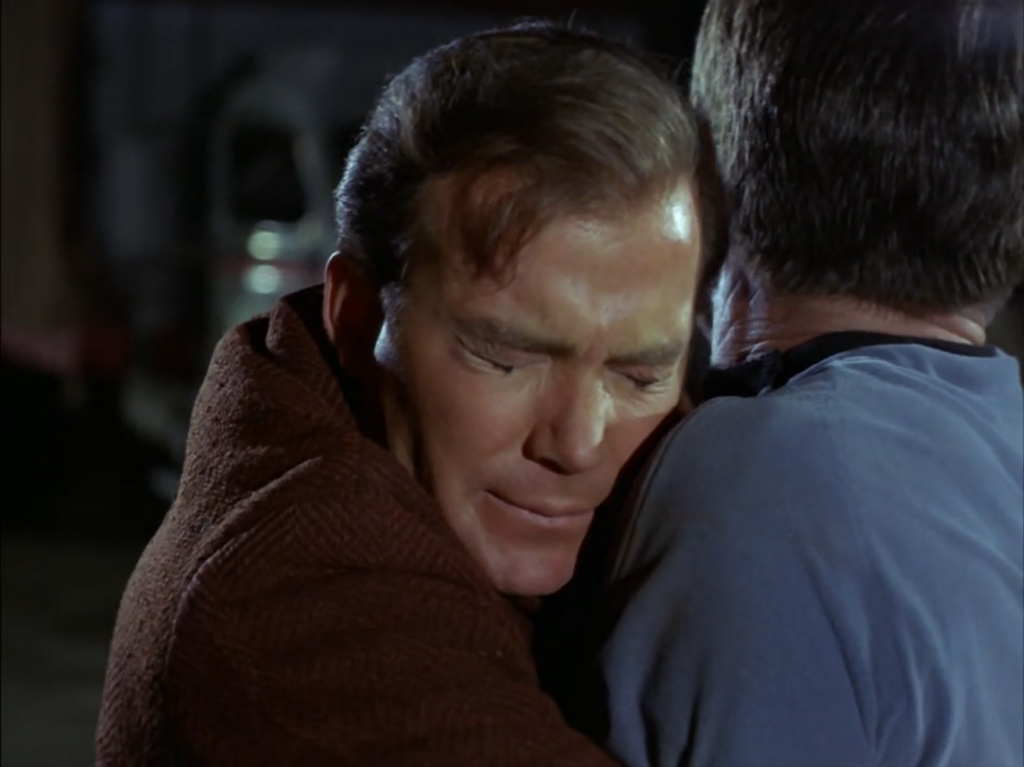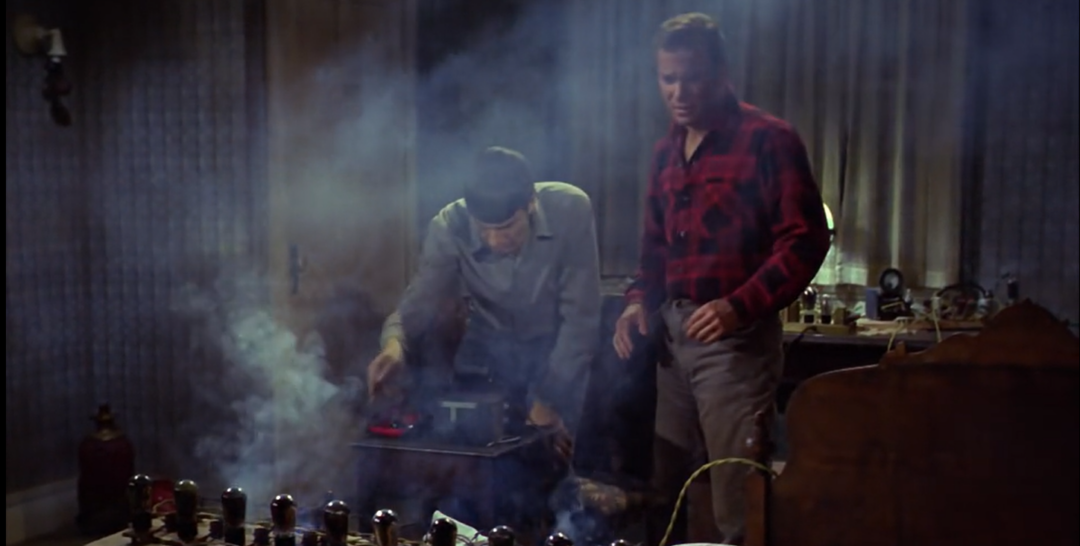Title: The City On The Edge Of Forever
Airdate: 3/30/1967
Plot Summary
The Enterprise gets bucked around by time displacement turbulence, causing Bones to accidentally inject himself with a full hypo of Cordazine. This causes him to go binky bonkers and beam down to a planet. Kirk, Spock, and company chase after him and discover the Guardian of Forever, a time gateway. Bones in his deranged state jumps in and destroys their present. The Enterprise disappears and Kirk and Spock are forced to repair the damage he’s done. But in the past, Kirk finds his choices to fix the past are more tragic than he could’ve imagined.
Risk Is Our Business
Shatner is absolutely pitch perfect in this episode, showing Kirk’s humor, decisiveness and absolute gut punching sadness. Kirk has to let someone he’s in love with die in order to make sure the future lives and it really damages him. He is the captain, over all else. He makes the correct decision at great personal cost.
Logical
Spock is pretty useful here, making a computer out of “Stone knives and bear skins.” He also truly understands what Kirk had to do and how it hurt him. You really understand the bond these two share after this episode.
Spock is also a little insulted that the Guardian thinks he’s a little primitive.

He’s Dead Jim
Bones is quite nuts most of this episode but the drug seems to wear off on its own. He also gets a moment to say “I’m a surgeon, not a psychiatrist.” Close enough.
Canon Maker
Time travel has already been established but the idea of the butterfly effect, first mentioned in Tomorrow Is Yesterday, is shown how bad it can be in this episode, it’s no longer theoretical.
Canon Breaker
I really can’t find anything to be canon breaking in this episode, however Bones does bring a phaser back in time that kills a guy when it goes on overload. Why it doesn’t blow up half the block as the episode The Conscience Of The King established is unknown. Also, wouldn’t this guy dying have a possible effect on the timeline?

Man It Feels Bad To Be a Red Shirt
No deaths. Or did all of them die when history was changed? Time travel gives me a headache.
Technobabble
A hypospray can be set to a particular drug. Handy. The tricorder can’t really playback stuff it scanned without a ship’s computer. Or a pile of vacuum tubes and wires that combust pretty easily.
I Know That Guy:
Joan Collins is sublime as Edith Keeler. She has a grace that you can absolutely believe Kirk falling for. She also makes some pointed comments, as when Spock says something to Kirk and she finishes with “Captain. … Even when he doesn’t say it, he says it.” She has a great resume, I don’t have to go through it all here.
Hal Baylor plays the policeman. He made a decent career out of playing soldiers or policemen in various movies and TV shows.
John Harmon plays the poor bum who lost his milk. Oh and got vaporized by a phaser. He had a lot of work but nothing too notable, except as multiple crooks in The Adventures of Superman.

What It Means To Be Human – Review
Ok I’m not going to mince words here, The City On The Edge Of Forever is far and away the best episode of the entire series and makes a good case for a top 5 of all the Star Trek series. Funny, as it comes just after the worst.
I never get tired of it, and the more Trek that has passed, not to mention all the non-canon stories, this episode has more and more emotional depth every time I watch it. Endlessly re-watchable.
Spock and Kirk’s relationship has to take center stage here as they are pretty much on their own the entire episode. Kirk is on task, trying to find McCoy and restore the future but he is more and more taken with Edith.
Who could blame him? She’s definitely a strong female character, not like what they define as these days. She’s trying to help people and dedicating her life to making things better for those during the depression. Indeed, she helps all three of them and gets run over by a car for her troubles. It’s not at all unbelievable that she would become a big player in national politics later on, though it would mess up where we need to go.
But she needs to die and Kirk must stop McCoy from saving her. What’s more tragic, or perhaps hopeful, is that she is correct in-universe. Man does achieve the future she dreams of but she has to sacrifice her life to get there. I suppose in a way, she brought it about after all.
Shatner stopping McCoy and Edith from getting killed is a gut punch. His grief and sadness are understated which makes it all the more powerful. No funny little coda at the end of the episode, he just says “Let’s get the hell out of here.” A line that speaks volumes to his mindset at that moment.
One of the best moments in the episode is Kirk mentioning that a novelist would write a novel that recommended the phrase “Let me help” even over “I love you.” I always thought this was brilliant. It’s a phrase that engenders vision of a hand outstretched. While government intervention, communism is usually with a closed fist, might makes right is how too many feel these days, “Let me help” really fits in nicely with the non-interference policy. The Federation will help IF you let it, it won’t impose. It’s that difference, the idea of helping without imposition is something we should look much harder at. Edith sort of supplements this in her speech telling them that if they can’t get off the booze or laziness, they can pound sand. Help with accountability. Strong stuff.
The little details are also great. Uhura is scanning the gateway when Spock and Kirk jump through, ostensibly to know when to jump through if Kirk and Spock failed. The blotches on McCoy’s face lessen as the drug wears off. And of course McCoy outraged telling Kirk “Do you know what you did?!” to which Spock, with volumes of emotion that he does not show, simply replies, “He knows, Doctor. He knows.”
My only complaint is not with the episode itself but that it was never referenced again. This should be something that really defines Kirk’s character going forward. I would’ve liked to have seen more than just another day at the office as far as future episodes go. Still, that just wasn’t how it was back in the 60’s. I’ll have to settle for a superb episode.
Harlan Ellison wrote this episode and famously hated how it turned out. Ironic as it is clearly the best TOS episode ever. I have read his reasoning and listened to various accounts and my only conclusion is that while he is a brilliant writer, he’s also an asshole. But so was Roddenberry. Tons of accounts on how it was rewritten, even some accounts that Scotty was to be a drug dealer in this episode. It’s unclear how accurate any of it is. Several people are credited unofficially of having a hand in it and it’s hard to know who is correct. Certainly, Ellison got the screen credit but boy is he sore about it.
The final product however speaks for itself. Good sci-fi, romance, a pitch perfect plot, and a tragic ending makes it an incredible episode.





